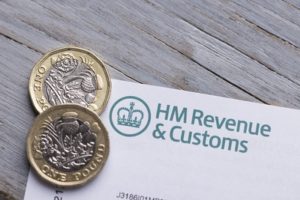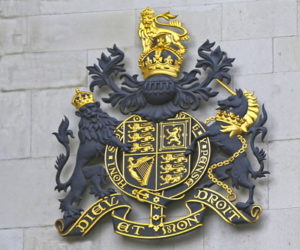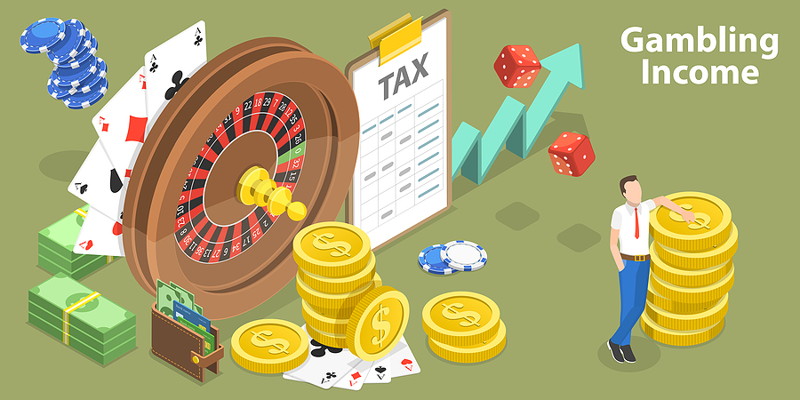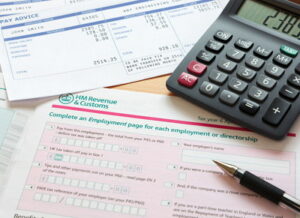 For most of us, getting involved in gambling incorporates placing a simple bet on our favourite sports event(s) or having a spin or two on a slot machine in the casino. It often doesn’t go beyond those limitations, although of course, some people do get more involved and become addicted to the activity.
For most of us, getting involved in gambling incorporates placing a simple bet on our favourite sports event(s) or having a spin or two on a slot machine in the casino. It often doesn’t go beyond those limitations, although of course, some people do get more involved and become addicted to the activity.
But let’s say that you engage in gambling, and you manage to be very successful with it, enough so that you can derive an income from it or perhaps you have had a large win and you now want to use that money to buy things.
For many people who receive larger payouts from their gambling activity, or are able to earn a consistent income from it, putting a deposit on a house and getting a mortgage, or buying a new car for example, are common. Certainly the likelihood is that your income source is checked into before you can secure a mortgage or buy an expensive car.
Or let’s say that you are under investigation by HMRC or even the police. In this scenario, you may also need to provide information on where your income is coming from. But how do you prove your gambling income? And is there a legal necessity to be able to do this?
Join us here for more information on how to go about proving your gambling income when it is needed.
Do You Have to Declare Payouts to HMRC?
 As many gamblers today will know, you don’t have to declare any of your gambling funds to HMRC. That fact applies to both amateur gamblers and professionals. However, even though this is the case, it is always good to keep a record of your gambling activity, especially if you do end up with a substantial enough payout or consistent income from a casino, exchange or bookmaker.
As many gamblers today will know, you don’t have to declare any of your gambling funds to HMRC. That fact applies to both amateur gamblers and professionals. However, even though this is the case, it is always good to keep a record of your gambling activity, especially if you do end up with a substantial enough payout or consistent income from a casino, exchange or bookmaker.
Should you be a person who is living off the money gained from gambling, or if you have utilised them to purchase a car or a holiday or anything else vast for example, then it may come to the point where HMRC is questioning how you’re able to live this way.
While you do not have to declare anything to HMRC when it comes to gambling, you may be asked to provide proof to the customs office of how you gained the money. This is more so to ensure that you can prove you did not come into possession of it through any criminal activity or by participating in tax evasion.
If you want to you can self declare gambling income to HMRC. There is a box you can fill in on a self-assessment or you can declare it directly over the phone. Any win will still need to be backed up by evidence if you are investigated but declaring up front gives you a paper trail that you can fall back on if things go wrong later. Like in the next example.
Why Proving Income Could Be Important
 In 2020, a case came to light regarding Mr Simon James McMillan, a former professional gambler, who had been handed a six-figure income tax bill by HMRC. The customs office launched its own investigation into McMillan after it noticed that large amounts of cash were being paid into the man’s bank accounts – of which he possessed 10 altogether.
In 2020, a case came to light regarding Mr Simon James McMillan, a former professional gambler, who had been handed a six-figure income tax bill by HMRC. The customs office launched its own investigation into McMillan after it noticed that large amounts of cash were being paid into the man’s bank accounts – of which he possessed 10 altogether.
There was no reasonable explanation for the receipt of such large amounts of money that HMRC could conjure up, and instead decided that he had failed to declare his income over a period of seven years. This led to Income Tax demands being raised against him, totalling £290,928. Additional late penalty payments of £132,193 were attached as well.
McMillan proceeded to challenge the tax demands and additional penalties in a First-tier Tribunal (FTT), arguing that the entirety of his income came via his success as a gambler. Regarding himself as a highly skilled poker player who frequently came out on top, as well as using a “sophisticated system” that would beat bookmakers on football bets, McMillan said he had gained all his money this way.
It was also noted that he had not been employed or self-employed in any way during those seven years. Yet he did not have any receipts or written way of proving his gambling income. Instead, he managed to convince the tribunal that this was the case through being backed up by several witnesses, describing his intricate football betting system, and by demonstrating his deep knowledge of high-stakes poker play. This led to the Income Tax demands and penalties being ruled invalid.
But it shouldn’t have to be that intrusive. Anyone experiencing income from gambling activity should be able to prove this in a simpler way than having to go through a tribunal.
Methods of Proving Your Gambling Income

You do not have to pay betting tax or income tax on the money you gain from partaking in gambling, there is nothing that actually says you must keep records of such. That hasn’t always been the case in the United Kingdom, because the activity was actually illegal up until 1960, which is when the Betting and Gambling Act of that year came into effect.
Through this, gamblers had to pay a 9% betting tax on either their stake or their income from gambling. Fortunately, that tax was abolished in 2001, rendering it no longer necessary.
It is left to gambling operators in the UK to pay tax on their revenue, with taxation on them falling into different categories. But the FTT case noted earlier does serve as quite the reminder to players that income and losses should really be treated as something more, and you should keep track of your activity this way.
Naturally, within that case, HMRC pointed to the lack of betting records being kept by Mr McMillan, and although the lack of records did not derail this Income Tax appeal, it would be wise to maintain records for any gambler so that this kind of scenario doesn’t occur.
As it happens, it is very simple to keep a record of your transactions online, because every time you deposit and every time you withdraw, the history of it is recorded within your online casino or sportsbook account.
Therefore, you only need to login to your chosen platform and visit your transaction history section to display figures of how much you have deposited and withdrawn, should it ever come into question. You’ll also be able to display the method(s) used for these transactions this way.
When it comes to partaking in gambling offline, things aren’t quite as simple as that, though. There is no automatic ledger kept when you play games with cash ion a casino. When you go to a bookie, you will receive a receipt regarding the bet(s) that you have placed, especially if placing those bets in cash.
It is good to hold on to these receipts for a couple of years, just in case. Your proof of the amount received is labelled there, so when you obtain that payout, you can prove it to whoever is asking.
Jackpot payouts that have occurred in land-based casinos won’t simply be paid out in cash most of the time, though. It’s usually the case that the casino has to do a lot of checks on the machine, the payout total, fill out various pieces of paperwork, and so on.
After this has all been completed, the person who secured the money will generally be on the receiving end of a cheque with the value on it. This can then be taken to your bank and deposited into an account or split between accounts etc.
A good thing to do to record this win is to have your photo taken with the cheque itself or photocopy it before cashing it. It’s not uncommon to see news articles of people who have claimed lottery payouts posing with their cheques, and this can obviously serve as a the record of gambling income.
Britain’s biggest ever lottery winners were revealed in May of 2022, and there is a photo of them being awarded a cheque for £184 million, which doubtless proves their source of that income.
Of course, you could also create your own record as an alternative. Whether gambling online or offline, set yourself a specific bankroll or a specific amount to play with per instance of gambling.
Let’s say for example that you decide to wager no more than £100 per month at a casino. You can simply note how much you enter the casino with and how much you finish the session with in your pocket.
The hope is always there that you will have more money than you started with at the end, but nothing is guaranteed in gambling. If you’re playing online, you could also choose to list the games played, the amounts wagered, the amount lost on that game etc.
Applying for a Mortgage as a Gambler
 When you apply for a mortgage, you will always need to prove that you have a source of income to cover the payments associated with that. Otherwise, there is no basis by which a creditor will loan you the necessary money for this.
When you apply for a mortgage, you will always need to prove that you have a source of income to cover the payments associated with that. Otherwise, there is no basis by which a creditor will loan you the necessary money for this.
Mortgage lenders only want to loan money at decent rates to applicants who represent the least amount of risk to them, so it is vital that you can prove you have the available funds to back up your request.
Transactions displayed on bank statements will be looked into, and obviously, if you’re betting online, the deposits and withdrawals from casinos will be clearly labelled this way. But again, if you have been gambling in cash offline, you will need to inform them of where the money is coming from, should it be acquired through gambling activity.
And if you are spending a high level of your money on gambling, then the mortgage lender may be hesitant to provide you with the necessary funds for purchasing a house.
Make sure that you have a clear history of both your incoming and outgoing transactions relating to gambling before you apply for a mortgage. This way, you can prove that you are earning some funds from gambling, which may supplement any income you gain from your everyday job.
Honesty is 100% the best policy in these circumstances and keeping a record of your betting behaviour is an ideal solution.
Self-Assessment
 It is also key to note that not everybody in the United Kingdom works as a full-time employee of a company. Some people are self-employed or freelance, and this requires the submission of a self-assessment tax form each year to HMRC.
It is also key to note that not everybody in the United Kingdom works as a full-time employee of a company. Some people are self-employed or freelance, and this requires the submission of a self-assessment tax form each year to HMRC.
Through this, calculations will be done on your yearly income to determine what taxes and National Insurance you need to pay. If this applies to you, then it would be very ideal to simply let the government know if you have been the recipient of a larger payout from gambling.
Of course, gambling income is not taxable by law, so you don’t necessarily have to provide the details of such. Yet you can use the ‘Other Information’ space on the form just to disclose the non-taxable gambling winnings, which would serve as full disclosure to HMRC. This would not be added to the calculations for your taxable income.
Professional and amateur gamblers, whether in full-time employment, self-employed or freelance, would only have to report information to HMRC if they have other sources of income that are not taken care of by their employer.
